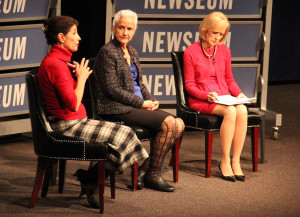WASHINGTON – The U.S. government should provide more intelligence information to families of hostages taken by terrorists and other enemies, and news organizations should be mindful of the dangers to freelancers in conflict zones, experts and two mothers of captured journalists said at an event Wednesday at the Newseum.
With the rise of journalists being killed and imprisoned in conflict zones, the panelists focused on steps the government and media organizations need to take to better protect journalists and how the U.S. should reform its current policy toward hostages.
“Our government needs to find a way to empower the families so that they feel some element of control in an environment in which they’ve effectively lost control,” said Joel Simon, executive director of the Committee to Protect Journalists.
Diane Foley, the mother of the late James Foley, spoke of the challenges she faced when she tried to get information about her son. James, a freelance journalist, was first captured in 2011 while reporting in Libya. After 44 days in jail, James was released and returned to America.
However, his time in captivity did not deter his passion for war reporting. Shortly after, he returned to Libya and covered the death of Muammar Gaddafi, the deposed leader of Libya.
He then began to cover the Syrian civil war, where he was captured in 2012. James’ captors demanded $132 million for his release; the America government refused to pay it as part of its no-ransom policy. In August 2014, James was killed by Islamic State militants and his execution was videotaped by the group and distributed on social media.

Diane Foley (left), the mother of the late James Foley, discusses the challenges she faced when trying to get information about her son while he was missing. Foley and Debra Tice (center), the mother of Austin Tice, a missing journalist, said the government must improve their communication with hostages’ families at the Newseum on Wednesday. (Photo by Madeline Fox)
Foley said she was first notified of her son’s death after she was called by an Associated Press reporter. The government did not contact her on the day the video was released and she only knew the video was authentic after she saw President Barack Obama speak on CNN that night, she said.
“Our bureaucracy didn’t work for us. They didn’t work for Jim,” Foley said.
She said in the aftermath of James’ death she met with British and French leaders where she learned their hostage families are privy to much more intelligence information.
The U.S. also needs to better communicate with other countries in efforts to secure the release of captured journalists, said Debra Tice, whose son has been missing since he was captured in Syria in 2012 while reporting as a freelance journalist.
Austin Tice, a former U.S. Marine, decided to spend a summer reporting in Syria while he was completing a law degree at Georgetown University. He was one of the few foreign journalists to remain in Syria as the war intensified.
In August 2012, he was kidnapped and a video released in September 2012 purportedly shows Tice blindfolded and being held by a group of masked men with guns. His whereabouts are unknown. CPJ estimates about 90 journalists have gone missing since the Syrian conflict began.
Tice said the U.S. and Syrian governments have told her family that they are working to help bring Austin home, but she said the governments are not discussing their efforts with each other.
The National Counterterrorism Center is conducting a review of the U.S. hostage policy and both the Foley and Tice families have been involved in the process.
The government is committed to better serving families and is working to create a consistent hostage policy, but will continue refusing to pay ransoms in exchange of hostages, said Douglas Frantz, a former journalist who now serves as the assistant secretary of state for public affairs.
“We’re going to come up with what I hope will be a cohesive and single policy,” Frantz said. “The idea that families in their darkest hours can’t get a consistent piece of information and don’t feel like they’re treated like human beings by the United States government is unacceptable.”
Frantz admitted the government did not have the right responses in place for hostage situations. However, he said he is confident the government review will result in a new policy that addresses those issues, including the lack of communication with families.
Both Foley and Tice disagreed with the stringent no-ransom policy, saying they believe no options should be taken off the table when it comes to trying to bring hostages home.
Kathleen Carroll, the Associated Press’ senior vice president and executive editor, said there needs to be more mindfulness in working with freelance journalists, suggesting there should probably be fewer freelancers. Both James Foley and Austin Tice worked as freelancers.
“You can’t absolve yourself of responsibly for these folks who are out in the field for you,” she said. “There has to be much more purposefulness.”
Carroll said she has been working with other news organizations and nonprofits such as the Committee to Protect Journalists at Columbia University to develop guidelines for freelancers and news organizations that hire them. The guidelines are set to be unveiled this week. However, she said the challenge with guidelines is that it is often difficult to plan in advance because situations such as captured journalists are “totally out of your control.”
“I can figure out what to do if I know what somebody wants and if you don’t know where they are and who has them or what someone wants, how do you figure out what that strategy is?” she said. “Matching passion for telling untold stories against that question is the story worth it, boy, there’s no answer for that.”





